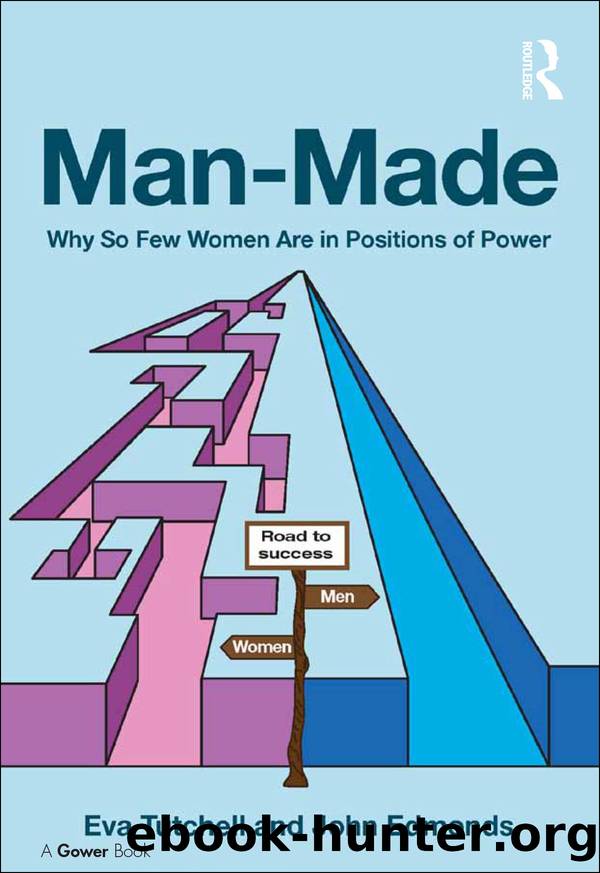Man-Made by Tutchell Eva; Edmonds John; & John Edmonds

Author:Tutchell, Eva; Edmonds, John; & John Edmonds
Language: eng
Format: epub
Publisher: Routledge
Published: 2015-07-14T16:00:00+00:00
* * *
Chapter 8
The Maternal Wall
* * *
Taking the Decision
Women still have to jump through hoops and over hurdles simply to get some career satisfaction and the possibility of advancement. But for many women the decision about whether and when to have a child is the most difficult one they face. What should be a natural and joyful right can become a minefield.
There is still a mismatch between how powerful people say they feel about the value of mothers and motherhood and how this is experienced by the women themselves. In answer to former President of Harvard and Secretary to the Treasury Laurence Summers’s grandiose statement, ‘Raising children … is the most important job in the world … The differences between men and women are innate’, academic Ann Crittenden1 retorts: ‘Raising children may be the most important job in the world, but you can’t put it on your résumé’ when you are searching for employment.
Towards the end of our interview with Brenda Hale, we asked her how far she felt we had come in the battle for equality. “The problem is systemic,” she replied, “The baby question will always be there. It won’t just go away” – words that will ring true for almost every working woman.
Liz McMeikan feels that “childbirth causes a career crisis for women. In her opinion private sector company career structures tend to be “rigid and unforgiving and some women’s careers never recover momentum”.
Helen Wells, who was Director of Opportunity Now, agrees. “For most women who are on the way up childcare responsibilities represent a huge problem.” Emma Howard Boyd goes further, saying, “At present many women feel that they must either not have children or behave as if they have none.”
Perhaps the biggest failure in western society is to have developed systems of work and power structures that do not take adequate account of the need for women to have babies and bring up their children.
The decision whether or not to have children is never taken lightly. For working women, with some idea of their future career prospects, it is a choice often made with an incomplete knowledge of potentially major implications.
Most of the women we interviewed do have children. Of those choosing not to, some said quite openly that their achievements would not have been possible if they had been mothers.
Christine Blower, General Secretary of the National Union of Teachers and herself the mother of two daughters cautioned: “For some women being ‘childfree’ is a genuine decision but for others it is a ‘constrained’ choice and that is terrible.”
Many women in jobs with a clear career trajectory decide to have children in their late thirties or early forties, making sure that they are firmly on the promotion ladder before risking maternity leave. Although this has advantages from a career perspective, delaying having children till later may affect fertility, so even this decision can be fraught with difficulties.
In answers to a questionnaire2 sent by Opportunity Now to 3,800 senior women managers and followed up by
Download
This site does not store any files on its server. We only index and link to content provided by other sites. Please contact the content providers to delete copyright contents if any and email us, we'll remove relevant links or contents immediately.
Tools of Titans by Timothy Ferriss(7816)
Change Your Questions, Change Your Life by Marilee Adams(7378)
Deep Work by Cal Newport(6563)
Man-made Catastrophes and Risk Information Concealment by Dmitry Chernov & Didier Sornette(5652)
Playing to Win_ How Strategy Really Works by A.G. Lafley & Roger L. Martin(5511)
Digital Minimalism by Cal Newport;(5394)
Big Magic: Creative Living Beyond Fear by Elizabeth Gilbert(5358)
The Slight Edge by Jeff Olson(5200)
The Motivation Myth by Jeff Haden(5005)
Ego Is the Enemy by Ryan Holiday(4959)
Stone's Rules by Roger Stone(4863)
The Laws of Human Nature by Robert Greene(4778)
Tuesdays with Morrie by Mitch Albom(4405)
Rising Strong by Brene Brown(4192)
Eat That Frog! by Brian Tracy(4149)
Skin in the Game by Nassim Nicholas Taleb(3971)
The Money Culture by Michael Lewis(3849)
Bullshit Jobs by David Graeber(3836)
Skin in the Game: Hidden Asymmetries in Daily Life by Nassim Nicholas Taleb(3726)
